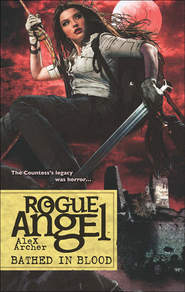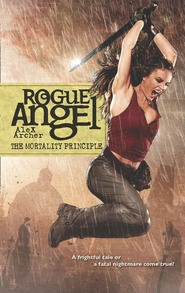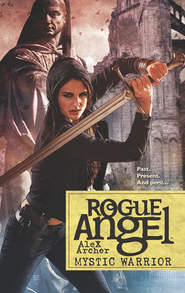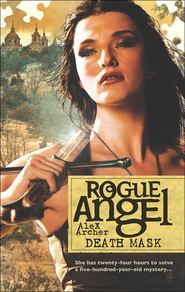По всем вопросам обращайтесь на: info@litportal.ru
(©) 2003-2024.
✖
Seeker's Curse
Автор
Год написания книги
2019
Настройки чтения
Размер шрифта
Высота строк
Поля
The tall nervous-looking man who stepped out to meet her wore a black leather greatcoat over a dark turtleneck sweater. He had a handlebar mustache backed by a three-day beard sprouting from his round face. The roundness was deceptive; he was lanky beneath the coat. Disconcertingly his left eye was milky, dead, beside his beak nose.
“You are Amanda Carter?” he asked in thickly accented English.
Annja followed the old WWII spy rule of using aliases with her own initials. It made them easier to remember and reduced the risk of some overlooked personal item tripping her up. She didn’t exactly have a lot of monogrammed possessions, but you could never be too sure at the stakes she was playing for. Besides, she felt the name was easy for non-native English speakers to pronounce—and more important, remember—as well as having the Waspy ring appropriate to her current cover story.
“Yes,” she said, remembering to be clipped and haughty. As wound up inside as she was it wasn’t hard to do. The pack had split and men began to drift up and down the street toward her. The members tended to keep their hands inside their voluminous coats. She was well aware they were positioning themselves to provide security against intrusion, accidental or otherwise. She also recognized a classic predatory move. Hemming in the prey and cutting off escape.
Remember, she told herself, you have something they want—access to abundant American cash.
“You are Enver Bajraktari?” she asked.
“Yes,” he said. He indicated over his shoulder. “And this my associate, Duka.”
Bajraktari cast a large shadow. Duka loomed like a mountain of bone and gristle over his boss’s right shoulder. He had thick black hair greased back from a face and mouth like a jack-o’-lantern carved from scar tissue. His eyes were dark crescents and his smile wide, revealing a jagged jumble of brown teeth. Annja made herself not stare at this disastrous failure of modern dentistry.
Because it suited her persona, and absurdly made her feel slightly better, she held up the black briefcase she had been carrying before her chest like a shield.
“Do you have the items we discussed?” she asked.
Bajraktari held out a hand. It was a surprisingly large hand, with long slender fingers. It was the sort of hand old-time pulp-mystery writers usually described as belonging to pianists and stranglers. Annja doubted the man played much Mozart.
In the big palm lay a figure cast in the shape of an elephant with trunk raised to forehead. It was either gold or gold washed. Although Annja was no authority on South Asian artifacts, it certainly looked authentic.
“You like.” His tone suggested a command, not a question or come-on.
“Maybe,” she said. “I trust you have more?”
Bajraktari looked at her with his one dark eye. “Come,” he said.
He turned and stalked into an oblong of blackness in the ratty building behind him. To Annja’s relief Duka followed him straightaway, bending his knees considerably to get through the door. His shoulders squeezed against the frame.
The other goons in view now stood seven or eight yards away toward both ends of the block. She had the option to follow or not.
She followed.
Inside was dim. It was cool to the edge of chill. A musty smell hit her in the face. Dust, mold, general antiquity and—
Pigeon droppings streaked down the sides of water-warped crates and decaying cardboard boxes and big vases Annja hoped weren’t ancient amphorae. They were caked in lumpy pale sedimentary layers on every horizontal surface and at the edges of walkways across the hardwood-plank floor of the warehouse. As her vision adjusted she saw it was a warehouse filled with unsteady-looking shelves laden with boxes and objects of uncertain nature.
Following her sketchy hosts, Annja advanced into the crowded interior. It wasn’t cave-black; a grayish illumination came from somewhere, like fog. Everything that wasn’t horizontal and caked in droppings, it seemed, was draped with cobwebs.
The narrow aisle ahead of Annja was blocked almost entirely by the mountainous mass of Duka, who progressed by leaning side to side, endangering the groaning, sagging shelves at every step, and teetering forward, as if he lacked knees or his legs were very short. Bajraktari was completely hidden by his massive underling.
Annja wondered how the huge henchman did it. She had to focus on walking down the very center of the wooden floor, with her shoulders unaccustomedly hunched forward to keep them from brushing anything, which might cover her in dust, inspire something awful to leap out at her or simply bring a whole overburdened rack of shelving down upon her head. Her shoulders, although broad for a woman even of her height, were nothing to Duka’s. Yet he managed to avoid mishap.
At the end of ten yards or so a space opened, seven or eight yards on either side. In the middle stood a large crate covered with some kind of dark cloth. A single lightbulb in a not very reflective reflector cone hung from a cord that led up into blackness so complete it might have gone on forever into the heart of infinite night. It spilled a yellow illumination upon the objects arranged on the cloth-covered surface.
Annja’s breath stuck in her throat. They were artifacts: statues, plates, bowls, coins. All gleaming bright gold. A mound of the stuff. A foot-high seated Buddha presided jovially over the lot.
“Samples,” Bajraktari said.
If it was all real—meaning both authentically ancient and actual solid gold, not just gold-washed lead, a trick the ancients were perfectly hip to—Annja was looking at upward of one hundred thousand dollars in plunder in the value of the metal alone. If you took into account the historic value, its price became incalculable.
Annja strode forward. As it happened that fit the role she was playing, but that had been driven right out of her mind by the sight. All she could think of now was confirming that she confronted evidence of a truly massive crime against archaeology. And circumstances suggested this was only the tip of the iceberg.
Reaching the makeshift display table, she snatched up the nearest item. Any evidence as to context was long lost already, especially if the loot had been polished, as appeared likely. Her finger oils weren’t going to damage the gleaming artifact if it was gold.
Annja stared down at the thing she held. It was a slightly irregular disk—a coin, imprint eroded by its passage through many previous hands. And time. She could almost feel the years adding to its not in-substantial weight. It showed the blurred image of the head of a youthful-looking, somewhat plump man.
To her amazement the letters stamped in it, faded though they were, were unmistakably Greek.
She turned to Bajraktari, who stood to her left with his shadow, Duka, looming as always behind him. “What’s a Greek coin doing here?” she demanded. “I thought these artifacts were Nepali.”
Instead of responding directly to her question, Bajraktari raised his head and said something sharp in Albanian. Annja sensed movement behind her.
Hard hands clamped like vises on her upper arms.
2
“What the hell do you think you’re doing, Bajraktari?” Annja demanded. She became aware of a grayed-out oblong glow farther back in the warehouse heights—a time-and-pigeon-grimed skylight. “Don’t you know who you’re dealing with?”
She knew even as the words left her mouth that she wasn’t going to like the answer.
Bajraktari smiled. “There has been a change of plan,” he said.
“Says who?” she demanded.
His coal-smudge brows twitched toward one another. “Do not try my patience, woman,” he said. “For in the end you are only a woman.”
It occurred to her this was not a good time to debate feminism. She settled for an angry toss of her head and a glare. “We had a deal,” she said.
He nodded. “So we did. But all things are subject to negotiation in this world, are they not?”
“I represent a very important figure in American business.”
“Just so. All Americans are rich. If your boss is rich by American standards, he must be really rolling in it, no?”
Annja’s lips compressed to a line. She could see where this was going.
“It occurred to us, therefore, that Allah had delivered into our hands a most wonderful opportunity. If your employer would pay handsomely once for our artifacts, then would he not pay handsomely twice for the treasure, as well as for the return of his very lovely assistant?”
“You’re making a mistake,” Annja said.
Bajraktari said something in Albanian. Around him, unseeable in shadow, his men laughed.
“It shall be as Allah wills,” the pack leader said. “If you are a religious woman, you should pray that it is not your employer who makes the worse mistake.”
Annja glared at him. She felt the men holding her shift their weight to drag her away. She drew in a deep breath. And prayed forgiveness for the grave sin she was about to commit against archaeology.











